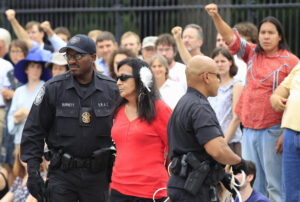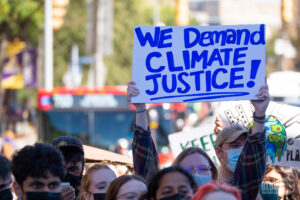Global Warming Is Getting Worse, Fast
Researchers are painting a dark picture. One new study involves warming of the planet, another deals with heat extremes and a third underlines what will happen if we do not reduce carbon emissions. Friends of the Earth Scotland / CC BY 2.0
Friends of the Earth Scotland / CC BY 2.0
Global surface temperatures during the three years from 2014 to 2016 – each hotter than the last – boosted the total level of global warming since 1900 by 25%, according to new research.
A separate study has confirmed that heat extremes, too, have outpaced the global average. Maximum temperatures during the hottest heat waves have in the last 30 years risen three times faster – especially in crowded cities that are home to more than 10 million – than average temperatures as a whole.
And a third study warns that unless the world’s nations start to reduce carbon emissions, then within the next 17 or 18 years, planetary temperatures will be at least 1.5°C above the world average for most of human history.
And 35 to 41 years from now, these temperatures will have climbed 2°C above the level that held before the Industrial Revolution, and the arrival of fossil fuels as a global energy source.
And that would represent a comprehensive failure of the agreement, in Paris in 2015, by 197 of the world’s nations to limit global warming to “well below” a 2°C rise by 2100.
Scientists report in the journal Geophysical Research Letters that between 1990 and 2013 the planet’s overall average annual temperature had climbed by 0.9°C. In the three years that followed, it jumped an additional 0.24°C.
The sudden temperature rise was matched by heatwaves, floods, droughts, global coral bleaching and extensive melting of polar ice during those three years.
The cyclic climate phenomenon called El Niño – a dramatic rise in ocean surface temperatures in the eastern Pacific – is in part the cause. But much of the additional warming can be linked to the increase in greenhouse gases in the global atmosphere.
“Our research shows global warming is accelerating,” said Jianjun Yin, a geoscientist at the University of Arizona, who led the study.
A second team report in the journal Earth’s Future that they looked at hottest-day-of-the-year data from 8,848 land surface weather stations around the world over a 50-year period. Highest temperatures rose by 0.19°C per decade over the five decades.
Over the last 30 years, they rose by almost 0.25°C per decade. Extreme heat readings in Paris, Moscow, Tokyo and other cities rose by as much as 0.6°C per decade during those years. One heat extreme in 2003 claimed 70,000 lives in Europe. Another in Russia in 2010 killed nearly 55,000.
“Our question now is: will this acceleration continue into the future?” asked Simon Michael Papalexiou, a civil engineer at the University of California Irvine, who led the research. “Because if it does, adverse effects for human societies are inevitable.”
And humankind does not have long to act, according to a study in the journal Nature Geoscience. British and Australian scientists report that they calculated the pattern of temperature rises if immediate action is not taken to reduce greenhouse gas emissions.
The answer is: not long. The ideal limit set by the Paris delegates in 2015 was 1.5°C. Without cuts in fossil fuel consumption, the planet will be at that temperature within 18 years.
“This study is important by providing a narrower window of how much carbon we may emit before reaching 1.5°C or 2°C warming,” said Ric Williams, professor of ocean sciences at Liverpool University, UK, and one of the authors.
“There is a real need to take action now in developing and adopting the new technologies to move to a more carbon-efficient or carbon-neutral future as we only have a limited window before reaching these warming targets.”
Your support is crucial…With an uncertain future and a new administration casting doubt on press freedoms, the danger is clear: The truth is at risk.
Now is the time to give. Your tax-deductible support allows us to dig deeper, delivering fearless investigative reporting and analysis that exposes what’s really happening — without compromise.
Stand with our courageous journalists. Donate today to protect a free press, uphold democracy and unearth untold stories.









You need to be a supporter to comment.
There are currently no responses to this article.
Be the first to respond.